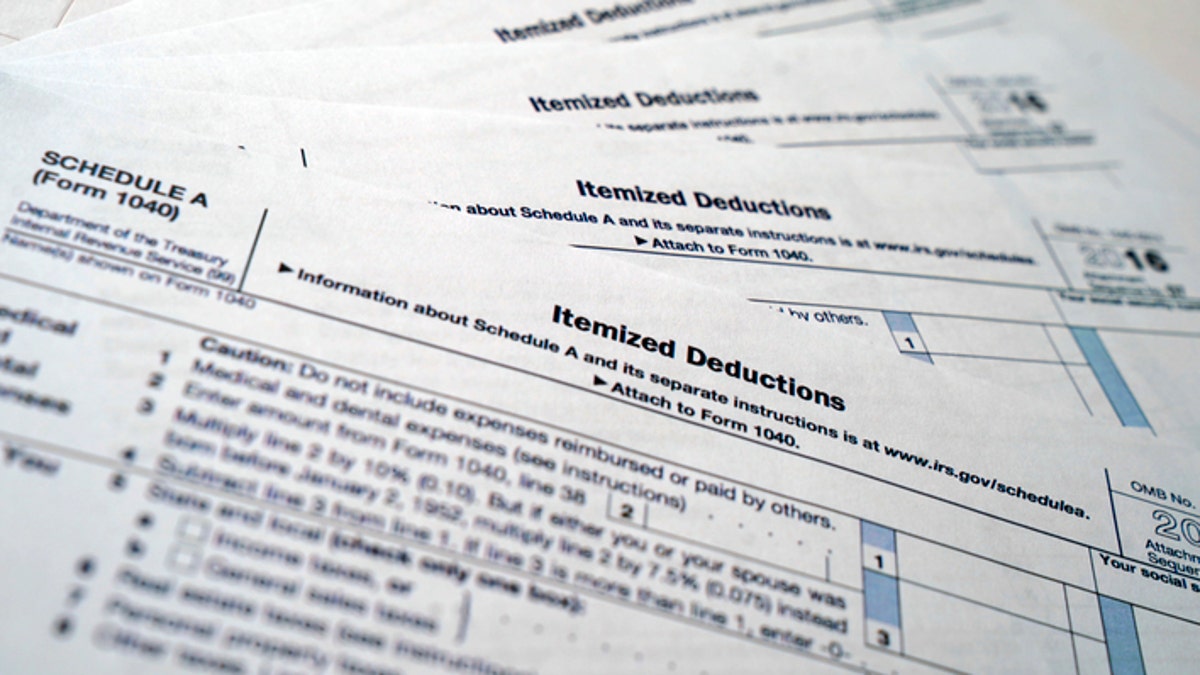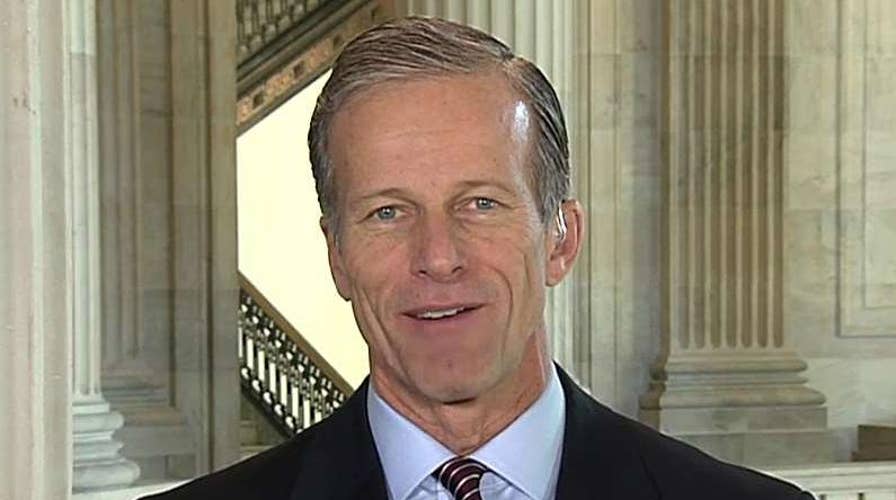Sen. Thune: 'I'm pretty optimistic' about tax reform
On 'America's Newsroom,' lawmaker says senators are getting close to the overhaul.
Tax reform has now won Senate approval, passed in a 51-49 vote shortly before 2 a.m. ET Saturday.
Senator Bob Corker, R-Tenn., was the only Republican to join the Democrats in opposing the proposal -- which now must be reconciled with the House version before advancing to President Trump's desk.
Initially, multiple Republicans were uncommitted to the bill, citing concerns with tax breaks for businesses or a potential increase in the federal deficit.
But enough of those skeptics within the GOP were won over to win passage -- in a victory for both Senate Majority Leader Mitch McConnell, R-Ky., and President Trump.
Here’s a look at what the Senate’s tax plan would do.
State and local deductions
The Senate’s tax plan would do away with most state and local tax deductions – meaning taxpayers in high-tax states would lose a write-off. This would impact mostly blue states, such as California and New York.
This is one area where the House and Senate plans previously diverged, especially as many lawmakers – including Republicans – opposed the provision. The Senate plan allows for deductions of up to $10,000 in local property taxes.
Previously, U.S. Sen. Susan Collins, R-Maine, was concerned about the impact the elimination of these deductions would have on taxpayers. She reportedly met with Trump to discuss a compromise in the final legislation, such as the one provided in the House measure.
At the "delight" of Collins, GOP lawmakers later added the property tax exemption, leading her to ultimately support the tax reform measure.
Pass-through provisions
Provisions for “pass-through” businesses shaped up to be one of the greater fights among lawmakers in the tax reform debate.
A pass-through business refers to one that is not a corporation, and therefore isn’t taxed as such. These include sole proprietorships, joint ventures, limited liability companies and S corporations. Millions of American businesses use the pass-through taxation format, where the profits are counted in the owners’ personal tax returns.
The Senate measure sets a new deduction of 23 percent for those who qualify for the pass-through taxation. It also makes it easier for taxpayers to obtain this deduction.
On the other hand, the House plan would reduce the tax from 39.6 percent to 25 percent. At odds here is which plan provides a greater savings for a greater number of pass-through businesses.
Individual mandate
The Senate’s tax plan includes a repeal of the individual mandate, the ObamaCare requirement for Americans to have health care.
The House bill does not include a repeal of the individual mandate.
Maine's Collins broke with her party and voted against a skinny repeal of the Obama-era health care earlier this year, but for this vote she was apparently satisfied that certain amendments were included.
The Congressional Budget Office predicted that repealing the mandate could reduce federal deficits by about $338 billion over the next 10 years. It would also increase the number of uninsured Americans by about 13 million people in that same time span.
Corporate tax rate
When it comes to reducing the corporate tax rate, the House and the Senate agree. Both chambers want to see the tax rate lowered to 20 percent from 35 percent -- and the Senate bill did just that on Friday night.
SENATE REPUBLICANS CONSIDER TAX BILL FIGHT, EYE LIGHTER TRIM TO CORPORATE TAX RATE
However, the Senate measure delays the implementation for one year.
Child tax credit
The Senate measure drastically hikes the current per-child tax credit to $2,000 from $1,000.
Some Republican senators, including Marco Rubio of Florida and Mike Lee of Utah, advocated for increasing the deduction. Earlier in November, Rubio criticized the House plan for not raising the credit enough.
The House plan would only raise it by $600.
The progressive Center on Budget and Policy Priorities has criticized the Senate proposal for not helping enough low-income families despite raising the credit. Writers for the think tank argued that many families would be unable to receive the full benefits.
Ivanka Trump, the presidential daughter and adviser, has been largely involved in working with lawmakers on boosting the child tax credit.
Standard deduction
The Senate bill increases the standard deduction level to $12,000 for individual filers and $24,000 for married couples. Standard deduction refers to the deduction of the amount of income Americans are taxed.
Republicans say that provision would be a net benefit for most tax filers.
Tax experts also predict that this provision would drastically decrease the number of taxpayers who would file itemized deductions as some would see a greater savings with this plan.
Mortgage deduction
The Senate tax reform measure leaves the mortgage deduction pretty much alone, capping it at $1 million. The Senate Finance Committee said this “incentive for homeownership provides tax relief to current and aspiring homeowners.”
The House plan, on the other hand, would drastically reduce the cap on the popular deduction to mortgage interest to $500,000.
Alternative minimum tax
Under the Senate's original plan, the alternative minimum tax would disappear -- much like under the House-passed bill. But under the revised Senate bill, the alternative minimum tax stays in place. However, the amount of income exempt from it is raised under the revised bill.
The tax is meant to offset benefits a person with a high income could receive. It also ensures taxpayers pay a minimum of tax, according to the IRS.
About 5 million households a year are targeted with the alternative minimum tax, NPR reported. Over the years, it has not been adjusted for inflation and has hit more households than originally intended, tax experts have said.
Estate tax
Republicans hope to phase out the so-called estate tax – sometimes referred to as the “death tax” by opponents – with their tax overhaul.
The federal estate tax is a tax on the transfer of property after someone’s death. That property must exceed a certain value amount for the tax to be applicable. Only the wealthiest 0.2 percent of estates owed any estate tax at last count, according to IRS data and the Center on Budget and Policy Priorities.
The Senate’s bill does not eliminate the tax, but it would double the exemption. On the other hand, the House version would double the exemption to $11 million for individuals and $22 million for couples, but would repeal the entire tax after 2023.
Medical expense deductions

The Senate's tax proposal would not eliminate the medical expense deductions, unlike the House plan. (AP Photo/Pablo Martinez Monsivais)
While the House plan would eliminate the medical expense deductions, the Senate measure leaves it in place.
Under the current system, taxpayers are able to deduct medical expenses that exceed 10 percent of a person’s adjusted gross income. That percentage is lowered to 7.5 percent for taxpayers who are over 65 years old.
AARP, the seniors' lobbying group, has urged Congress to keep the deduction in place.
"For people who are sick, many of whom are going to be older Americans, this medical expense deduction makes their health care more affordable," said Cristina Martin Firvida, AARP's lead lobbyist on financial security issues. "To them, it is a very big deal."
Tax brackets
The Senate bill keeps the current number of personal income tax brackets, seven, though it changes the rates to 10, 12, 22, 24, 32, 35 and 38.5 percent. That last top bracket for the wealthiest earners carries a higher rate of 39.6 percent under current law.
The House bill goes further toward simplifying the tax system. It shrinks the number of brackets from seven to four, with rates of 12, 25, 35 and 39.6 percent.
Fox News' Chad Pergram and the Associated Press contributed to this report.





